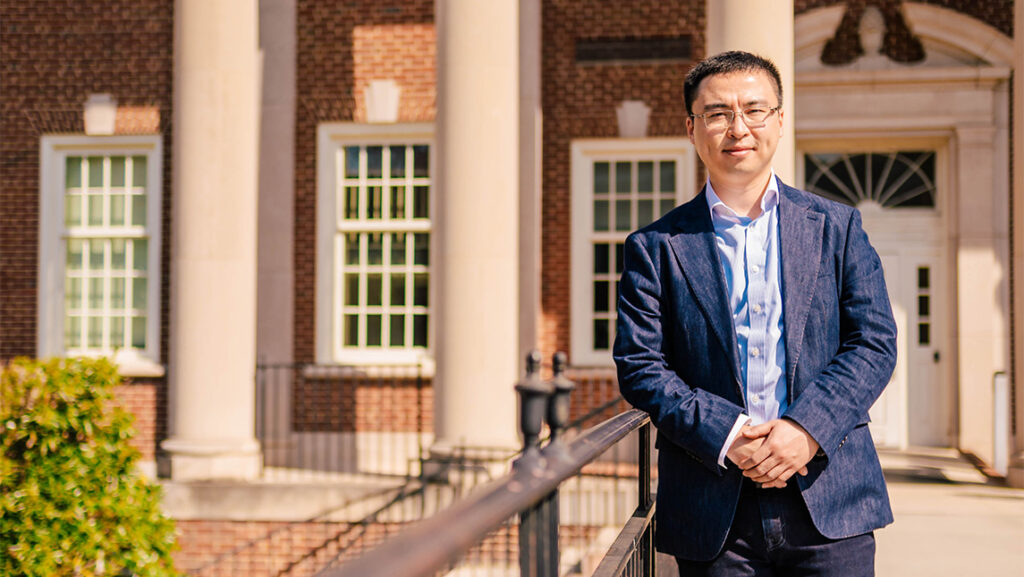
The COVID-19 pandemic has caused drastic effects on almost every aspect of our lives, including the shutdown of the global economy. But there’s one sector of the economy that many people in need of work are turning to, and this has presented one UNC Greensboro professor with a unique research opportunity.
Dr. Brianna Caza, associate professor in the Department of Management in the Bryan School of Business and Economics, has been studying the gig economy for eight years – particularly identity and interpersonal dynamics related to the gig economy, multiple role holding, and marginalized work populations. The gig economy is a free market system based on flexible, temporary, or freelance jobs, making it ideal for those that are seeking new work or side hustles for supplemental income during this time of economic shutdown and remote work. Some might be turning their hobby into a freelance opportunity by selling their skills online. Some might be signing up to deliver food and groceries through apps like Uber Eats and Instacart.
Caza’s research focuses on resilience in turbulent and dynamic work contexts and how professionals can thrive amidst unexpected events and environmental changes. And as independent workers and the economy as a whole face perhaps the most unexpected, significant workplace disruption of this generation, she explains the subsequent effects of the pandemic on the gig economy in the Q&A below.
Your research focuses on resilience in the workplace. Can you speak on the resilience of workers during the pandemic?
I’ve been studying resilience since graduate school. When I first started examining it, we were still trying to make the business case for resilience and why it was an important competency that all workers should develop and use. It was primarily seen as something that was only important for those who worked in certain types of occupations such as doctors, first responders, and so on. The pandemic has made it clear that we are all at risk for unexpected disruptions, and all workers need to be able to be resilient. This unexpected global challenge has disrupted many aspects of our day-to-day lives and our economy. All workers are being called upon to be agile, adaptable, and find ways to grow from challenge and disruption.
What effect is COVID-19 having on the gig economy? Is it good, bad, or both?
Both. It is impacting gig workers differently depending on their industry, location, and personal circumstances. My colleagues and I began gathering data on a group of independent scientists back in November, before the pandemic hit North America. Recently, we launched a follow-up survey to learn how their work has changed in the past few months and how the pandemic was affecting them. While we haven’t fully analyzed the data yet, an early glimpse suggests that the scope and direction of the impact is scattered across the board. Some scientists said the pandemic really impacted them negatively because they couldn’t be in the lab, their salary was taking a hit, they couldn’t travel for their job as usual, and so on. Some said the pandemic didn’t really affect them much as they were still able to complete their gigs and work remotely. We also had some scientists report that they were getting more work because many companies were hiring scientists to investigate issues related to the COVID-19 situation.
Our data suggests that people that are already in the gig economy may be experiencing a lot of different changes – more work, less work, and so on. Freelance graphic designers whose work is typically online may not be affected as much as freelance photographers who may not have weddings, parties, or other events to cover during this time.
At the same time, based on Google trend data and anecdotal reports, there also seems to be a rising interest in the gig economy from those who were not previously working independently. This could be because people have been laid off due to the pandemic, and they are now pushed into researching independent work as an alternative source of income. Or, some aren’t laid off yet, but there’s a threat that they will be, and they want to protect their financial viability by proactively looking for second or third jobs to supplement their income. And some people just don’t feel comfortable enough to return to work at their organization as the pandemic continues to surge, so they may be looking for options for remote work.
Finally, I think there may also be psychological factors that are motivating people to investigate options in the gig economy. The sense of autonomy one gets by being an independent worker might be valued more as we see organizations potentially shutting down. Some might be less willing to rely on somebody else, like an organization, for their financial viability. All of these things may lead workers to become curious about participating in the gig economy.
Looking back at how the last recession really ignited the gig economy, will we see this same trend following the current recession?
This is a great question, but it is one I don’t have a clear answer for. I’ve been looking for data that accurately tracks the gig economy and the multiple job-holding sector specifically for a while, and found that it is quite elusive. I think it is difficult to get accurate numbers because of the way employment data is tracked in this country and even globally. But generally speaking, in the last ten years, there’s been a consensus among experts that the gig economy is thriving. In fact some even say that all of the net growth in the American economy in the past five years has been in the gig sector. So, the gig economy has definitely been on an upwards trend even before the pandemic and this recession. My prediction is that we will see an even higher jump in these numbers in the next few years because people are more open to considering it as a career option.
For example, I looked at Google trend data for searches on the terms “second job” and “multiple jobs,” and there was a huge spike in Google searches for “second job” in late March. So right as things were shutting down, there was a surge of interest in secondary employment. It’s definitely intuitive that people will look for alternative employment if they feel their job security is uncertain, but I was still surprised at how big the jump was.
What do you predict for the future of the gig economy?
It feels very hard to predict anything at the moment. But before the pandemic, I would’ve predicted that my school-aged children had a very high likelihood of generating at least some portion of their income as independent workers over the course of their careers. I think the data shows that the number of full-time organizational jobs is waning as a result of both supply and demand. We see that many workers these days hold many different jobs in their lifetime, so they are jumping from job to job a lot more than they used to be. So like I said, there has already been an increase in the gig economy. I think there will be even more of an increase now that people are seeing the benefits of remote work due to the pandemic.
I don’t think we are going to become a completely remote, online, independent economy in any way, though. There is a really important role that organizations play in people’s lives, and we’ve seen independent workers suffer from lacking this, resulting in identity struggles, loneliness, lacking a sense of belonging to a group, and so on. However, we might now see a change in organizations that might make their day-to-day operations look a little more like what we see in the gig economy. For example, with a higher level of uncertainty about the future, some organizations may opt to hire short-term contractors for projects. Additionally, the remote work imperative may mean that even organizational workers have more autonomy, flexibility, and responsibility at the moment. The increase in these job characteristics may even continue post-pandemic for some, now that they’ve proven that they can be productive when working from home with increased freedom.
You and your research team were recently awarded a $97,000 grant from the Society for Industrial and Organizational Psychology for your project “Working Off the Grid: Building Resilience in the GIG Economy.” Can you tell me about the project?
There’s a lot of industries where people can work for either large organizations or work independently as a gig worker, and my colleagues, professor Sue Ashford from the University of Michigan and Brittany Lambert, a doctoral student from the University of Colorado, and I are really interested in better understanding the differences between workers’ experiences inside and outside organizations. Specifically, we are conducting a comparison study to better understand the individual resources–the psychological tendencies and behaviors–that help people thrive in each context.
We then aim to develop an intervention that independent workers can utilize themselves – whether it’s cognitive reframing, inspired by cognitive-behavioral therapy techniques, or a small behavioral task they can enact each day – that’s going to help them when working in this organization-less environment.
We are currently in the preliminary stages of the project and will begin interviewing matched samples of independent and employed workers from the same industries this fall. Through these interviews and a series of laboratory studies, we will develop and assess three different interventions to investigate ways of helping people be resilient when working on their own without an organization providing them with different forms of support and resources. Then, in the spring, we will test the interventions we have developed in a field sample of independent workers
Ultimately, we want to empower people, specifically independent workers, to take control of their own resilience – to be able to bounce back from setbacks – which we believe from our research is a muscle that you can build, not an innate trait that you either have or don’t have. It’s something you can develop over time through practice. The ultimate goal of our research is to help guide independent workers, to point out where they should invest their time and effort, so that they can develop greater levels of resilience.
Interview by Alexandra McQueen, University Communications
Photography by Martin W. Kane, University Communications


